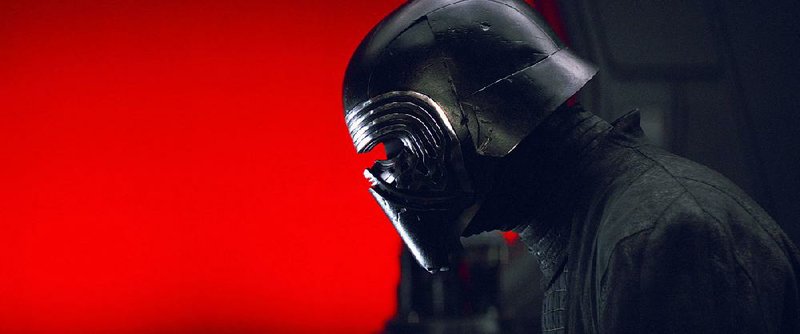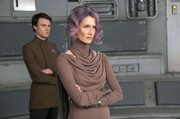The original Star Wars concept, closely hewn to Joseph Campbell's "Hero's Journey" archetypal story pattern, was always built around myths and totems: Vader's mask, Luke's light saber, the Falcon, the Force, the Death Star, the Jedi Knights themselves.
You could divvy up the characters between the true believers of mysticism and mythos, and the cynical nonbelievers, who considered nothing beyond the limited range of their own vision. Not coincidentally, you could generally count on the rebels (the "resistance" in this batch of sequels) to be the former; and the Empire ("First Order") to embody the latter, but to George Lucas' credit, his most interesting characters were the ones who betrayed their standing.
Han Solo (Harrison Ford) was the original disbeliever -- from (sigh) Episode IV: "Hokey religions and ancient weapons are no match for a good blaster at your side, kid." Though he eventually came around to the idea of the Force (mainly a quasi-secular stand-in for "soul,"), he started out as cynical as one of those power-grubbing toads in the Death Star. He was in it for the dough, before he changed his mind, disavowing his previously skeptical stance, falling in love in the process.
Darth Vader himself was a similar sort of iconoclast: He was a true believer and disciple of the Force who was in it for something more than money or glory. He wanted the Force to be recognized as the absolute power in the universe that he alone wielded, and he wanted to share that vision with his only son.
This new trilogy is centered on a similarly conflicted figure, Kylo Ren (Adam Driver), the son of Leia (Carrie Fisher) and the late Solo, whom Ren murdered at the end of The Force Awakens. As this film opens, Ren is shown still torn in his affiliations. Is he a true adherent of the evil Supreme Leader Snoke (Andy Serkis), who is so filled with malevolence he spends his days sitting on a throne in what appears to be a blood-red, modernist furniture showroom; or is he the perpetually sad and conflicted son of a pair of heroes, still searching for a way out of his personal darkness?
Rey (Daisy Ridley) thinks she knows the answer. Training on a remote island with the reluctant Luke Skywalker (Mark Hamill), she keeps involuntarily connecting with Ren, as he sits in his imperial star destroyer, slowly wiping out Resistance ships, along with the succubus-like General Hux (Domhnall Gleeson, whose sniveling sideburns alone are enough to hate him for), waiting for the last rebel fleet to run out of fuel so they can be destroyed permanently. Through their connection with the Force, Ren and Rey see each other across time and space and have virtual conversations about their true natures.
Basing yet another film on the emotional state of Kylo Ren seems more than a bit reductive -- I think our Emo Darth should just be left alone in his current state of evil, personally -- but talented writer/director Rian Johnson, a deep-set Star Wars fan from the series' inception, wants to plumb the further depths of the Dark Side, and show the power of the balance between all things (what gives the Jedi his faith). His film is far less calculating than the previous J.J. Abrams vehicle, which spun the series' greatest hits, and more or less plundered, beat-for-beat, the original's (A New Hope) construction. Johnson wants to craft and cultivate the mythos, attempting to deepen our understanding, even as he's spinning no fewer than five subplots, all hurtling at us at once.
There is the aforementioned Rey/Ren situation, and her training with the soul-shattered Luke, whose attempt to help his nephew harness his formidable gifts left his students dead, his dojo aflame, and his best pupil a disciple of the serpentine Snoke (the lamest villain name in the modern era: "Snoke" sounds like the name of a particularly sassy animated hamster). Then we have the fate of the last rebel transport ship, being dogged by Imperial Destroyers, who can track their every move in hyperspace.
Behind the grand heroisms of super-pilot Poe (Oscar Isaac), the former stormtrooper Finn (John Boyega) and hardy technician Rose (Kelly Marie Tran) are dispatched on a last-hope mission to a casino planet to track down a master hacker, who can shut down the First Order's defenses long enough for them to infiltrate the enemy ship and disable their ability to track them. Poe also has his hands full with Vice Admiral Holdo (Laura Dern), forced into duty after Leia is badly wounded in a battle.
When the film's bursting kinetic energy works, such as in its scintillating first 20 minutes, Johnson sets so many wheels in motion, it's a joy to watch him harness their momentum and hurtle us from moment to moment like a hyperactive teenager on an amphetamine bender. The film is long, however, and begins to feel more than a little labored by the time the various epic showdowns finally take place.
Still, you can always feel Johnson's love and devotion to the series -- it's fish in a barrel, honestly, but the legion of fan-boys and girls are dutifully presented with much to whoop about (as did our audience of supposedly coldly professional scribes) -- and his touch, always elegant, plays nicely to the series as a whole.
However, as much time and energy has been devoted to the goings on of Rey, Ren, and their various friends and enemies, try as the film might, it doesn't generate much in the way of genuine interest in these characters. There's simply too much of a derivative feel to so many of them -- Rey is essentially Luke, writ female, a young heroine in search of her place in the galaxy and the truth of her true parentage; Ren is like a pouting Millennial Vader before entirely giving in to the darkness in his soul; Poe is the charming-but-reckless Han Solo character, etc. -- that it's hard to take any of them seriously or be genuinely emotionally committed to their well-being.
Spotty casting has also not particularly helped the film's cause: Ridley never seems quite capable of the fierceness she is meant to employ; Isaac, given more to do here than in the first film, still doesn't offer terribly much to distinguish the "hotshot" rebellious pilot he's meant to inhabit; and the issues with the aforementioned Driver, whose suffering eyes and pouty mouth makes him appear more like a furious 'tween than a commanding master of the darkness, continue unabated. He's a bit like King Joffrey from Game of Thrones, easily dislikable, but hardly intimidating.
In short, there is a dearth of friction between the characters, either as bitter enemies, wayward children, or romantic entanglements. It's like we're watching the ubiquitous action figures from a Wal-Mart shelf enacting their own adventures. Lucas famously sunk the original trilogy by turning all the many, many Ewok scenes from Return of the Jedi into a kind of Hasbro infomercial; here, it's like the entire enterprise is largely crafted around its own merchandise.
The film has its moments. Early on, Poe's deadpan reaction to a spit-flying diatribe by Hux in the film's early set-to is one of the funniest moments in any Star Wars film. There's a gorgeous shot of the forlorn island Luke inhabits. And some wordless scenes suggest inner lives inhabited by the characters. But though it sometimes seems as though Johnson's devotion and care alone might power the film through its more glaring difficulties, by the end -- with the focus clearly set on the next installment some two years hence, so much has had to happen -- it feels weighed down by its obligations.
It's an enjoyable enough ride, I suppose, but not one I very much feel like embarking upon again anytime soon, though it is very likely my daughter will have some strong thoughts for me on that particular subject.
It can hardly be called Johnson's fault. The original Star Wars (yes, I mean ^&$*# Episode IV) was put together with hope and bailing wire, and only because Lucas couldn't pry away the rights to Buck Rogers in order to remake it. By now, the Galaxy Far Far Away is essentially an intergalactic money-press for Disney Corp., which bought LucasFilm a few years back with this very apparatus in mind.
We will be treated to a new Star Wars entry each year -- alternating between "canon" films such as from this current trilogy, and special one-offs, such as last year's underwhelming Rogue One, and the forthcoming Solo -- until most of us are safely tucked into our graves. Without any particular sense of urgency, these films lope along, performing their tricks, offering various shoutouts to the die-hards who base much of their waking life to them, and keep the cash register ringing.
In this way, we might all be too late: It seems the Empire has already won.
MovieStyle on 12/15/2017



